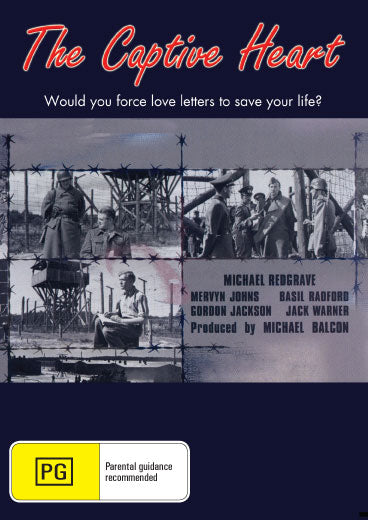rareandcollectibledvds
The Captive Heart
The Captive Heart
 Before you ORDER please check do you wish to order a DVD or a Digital Download file
Before you ORDER please check do you wish to order a DVD or a Digital Download fileFor DVD use the GET DVD Button
For a Digital Download use the DOWNLOAD Button
Couldn't load pickup availability
After the evacuation at Dunkirk, June 1940, some thousands of British prisoners are sent to German P.O.W. camps. One such group includes “Capt. Geoffrey Mitchell,” a concentration-camp escapee who assumed the identity of a dead British officer. To avoid exposure, “Mitchell” must correspond with the dead man’s estranged wife Celia. But eventual exposure seems certain, and the men must find a way to get him out. If he reaches England, though, what will his reception be? Would you forge love letters to save your life?
STARS: Michael Redgrave, Rachel Kempson, Frederick Leister
86 min | Drama, War | 1946 | Color
Movies with low demand and/or out of print are manufactured-to-order using high quality recordable DVDs. Please read FAQs if unsure, or send a query.
All DVDs are Region 0 and are guaranteed to play on any DVD player in any country in the world
Satisfaction Guarantee – if you are not satisfied with any aspect of your purchase then we will explore all options to rectify the issue
COMBINED POSTAGE: ONLY CHARGED FOR THE FIRST DVD ALL OTHERS IN A MULTIPLE ORDER ARE POST FREE
Postage: Free In Australia.
Postage: Rest Of The World at Table Rate
All DVDs come in a DVD case with color artwork and printed disc
All DVDs are available as an MPEG4 file sent to you via an email link. Save on postage and waiting time. Transfer can take up to 12 hours depending on the time zone you are in.
Superb
The Captive Heart For me, this is one of the very best WW2 films ever made. Several reasons account for that judgment, including the fact that it was made so soon after the end of the War and it was partly shot in Germany. In this film there is none of the “at ease” rubbish seen later in Stalag 17, it is told as it really was with honesty and heroism both in the Camp and back in Blighty. The British cast and those behind the cameras do a superb job throughout and the story remains as absorbing today as it was when first told in 1946. Finally, I do have to confess that my late Father was a member of the accredited 51st Highland Division and does appear on-screen for a few seconds during an a German announcement to the prisoners, so it also keeps him alive to me and my family.
A low key, but highly charged stiff-upper-lip flick
Great plot, excellently under-stated performances, writing and direction. The fact that this film was made in 1946, so close to the events its depicts, seems to add an almost documentary-like quality to this film. Indeed, in the opening credits, the line ‘Filmed in the British Zone of Western Germany’ suggest that the realistic prison-camp scenes were probably shot in genuine locations. The cast is almost a repertory company of British 1940s actors – but no-one is taking an easy ride. There are fresh and challenging performances, even though the faces are familiar. What struck me is how the film is free of the gung-ho ‘smart prisoners, dumb Krauts’ type of prison camp film that dominated the genre later on. This film is the product of a people tired of war. At the same time, it retains some of the stiff upper lip feel of many British wartime films, but with the confidence of victory, it does not need to indulge in the ‘beastly Hun’ elements. Moving without being sentimental. A very ‘human’ film, only a few steps short of a masterpiece.
The Captive Heart After the evacuation at Dunkirk, June 1940, some thousands of British prisoners are sent to German P.O.W. camps. One such group includes “Capt. Geoffrey Mitchell,” a concentration-camp escapee who assumed the identity of a dead British officer. To avoid exposure, “Mitchell” must correspond with the dead man’s estranged wife Celia. But eventual exposure seems certain, and the men must find a way to get him out. If he reaches England, though, what will his reception be? Would you forge love letters to save your life?


